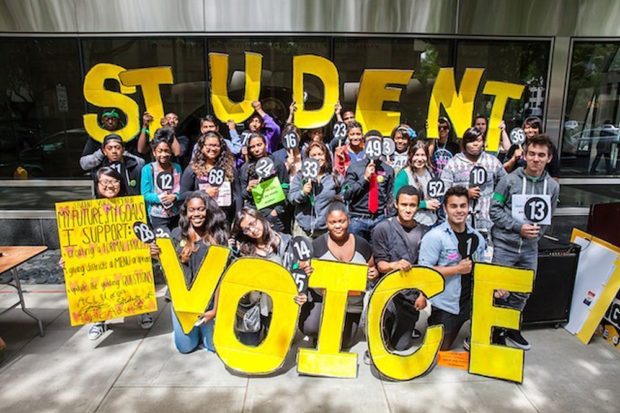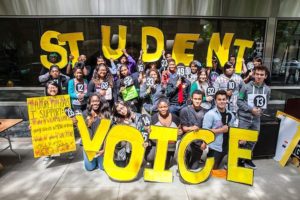
By Saa’un P. Bell

On May 8, about 50 student leaders across California assembled to urge the State Board of Education for greater student participation in the state’s new school funding law, known as the Local Control Funding Formula (LCFF).
“You see us in the crowd,” said Jalissa Sanders, a student activist from the Student Voice Coalition and Californians for Justice who attends Poly High School in the Long Beach Unified School District. “Our voices, our faces have gone unheard, unseen. This is how it feels to be seen as an index score, a drop out percentage, a number.”
The day marked the beginning of a student movement for student voice. Hundreds of students across 11 districts, including Fresno Unified, launched a statewide student voice campaign called “My Future, My Voice.” The campaign will focus on giving students a rightful place in implementation of the LCFF, the state’s new school funding program designed to bring educational equity and support for high-need students.
“Our first step in the Student Voice Campaign is for (state) board members to meet with us to really hear student proposals,” said Shydae Garcia, a student activist from the Fresno Unified School District and Californians for Justice. “Students need to be heard,” she continued. “We’ve already met with board members Bruce Holaday and Jesse Zhang, but are still waiting to meet with Dr. Michael Kirst and Sue Burr.”
The launch of the “My Future, My Voice” campaign at the State Board of Education headquarters in Sacramento is the result of unanswered student demands over the past year to have a voice in the development of Local Control Accountability Plans (LCAPs). Each local school district is required to develop an LCAP to outline how LCFF money will be spent to support programs and services for high-need students. There has been growing frustration among students by what they feel is a lack of engagement in the process.
“Teachers, administrators and parents all have a clear role in local control and accountability plans, whereas we do not,” said Naudika Williams, a student activist from the Oakland Unified School District.
Students are advocating for the State Board of Education to lay out a clear role for them in the development of the LCAPs.
“We were the ones showing up to the LCAP community meetings because we care about how our districts spend LCFF dollars,” said Christian Valencia, a student activist from the Coachella Valley Unified School District and a member of Inland Congregations United for Change. “Students weren’t invited,” he continued.
Fresno Unified is doing the bare minimum required by the state, which is to solely engage already-established committees like the District Advisory Council and the Student Advisory Board. However, students and parents/guardians are frustrated because they feel this is not enough and it’s not effective.
They are pushing the district to exhaust all efforts to make sure everyone has a chance to weigh in, especially in a way that’s accessible for those who can’t make the meetings, speak a language other than English or don’t have access to a computer and the Internet. Pushing for there to be more “teeth” in the LCFF/LCAP regulations on the state level will push Fresno Unified to go above and beyond the minimum and meaningfully engage parents/guardians and students.
Students are demanding that the State Board pass the LCFF regulations, which require a formal process allowing student voice and participation including the following:
- Create a formal process for student input.
- Give school districts a menu of options to engage students.
- Update the Guiding Questions in the LCAP template to show how school districts can meaningfully engage high-need students.
Despite being the largest stakeholder in the public education system—6.2 million to be exact—in the LCFF students are being forgotten, overlooked because they are too young to vote. But who are we serving here—political interest groups or the students and their futures?
The LCAP for Fresno is scheduled to be approved by the Fresno Unified trustees on June 4. For more information and/or to comment/ask questions, contact Tammy Townsend at tammy.townsend@fresnounified.org or 559-457-3661.
*****
Saa’un P. Bell is an organizer with Californians for Justice and a supporter of the Student Voice Coalition/Campaign. The Student Voice Coalition/Campaign is led by student leaders from across California and was founded by Californians for Justice in February 2014 as a way to unite youth organizations across the state to win a clear and meaningful role for students in the Local Control Funding Formula (LCFF). To learn more, visit www.caljustice.org/studentvoice.
